

Charles Baudelaire. Charles Pierre Baudelaire (French: [ʃaʁl bodlɛʁ]; April 9, 1821 – August 31, 1867) was a French poet who also produced notable work as an essayist, art critic, and pioneering translator of Edgar Allan Poe.
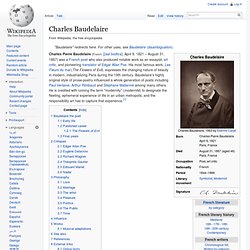
His most famous work, Les Fleurs du mal (The Flowers of Evil), expresses the changing nature of beauty in modern, industrializing Paris during the 19th century. Baudelaire's highly original style of prose-poetry influenced a whole generation of poets including Paul Verlaine, Arthur Rimbaud and Stéphane Mallarmé among many others. He is credited with coining the term "modernity" (modernité) to designate the fleeting, ephemeral experience of life in an urban metropolis, and the responsibility art has to capture that experience.[1] Baudelaire the poet[edit] Baudelaire is one of the major innovators in French literature.
Early life[edit] Baudelaire was educated in Lyon, where he boarded. Portrait by Emile Deroy (1820–1846) Les Fleurs du mal. The first edition of Les Fleurs du mal with author's notes.
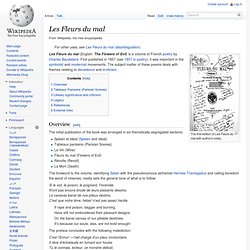
Overview[edit] The initial publication of the book was arranged in six thematically segregated sections: The foreword to the volume, identifying Satan with the pseudonymous alchemist Hermes Trismegistus and calling boredom the worst of miseries, neatly sets the general tone of what is to follow: Si le viol, le poison, le poignard, l'incendie,N'ont pas encore brodé de leurs plaisants dessinsLe canevas banal de nos piteux destins,C'est que notre âme, hélas! N'est pas assez hardie. Gertrude Stein. William Faulkner. Biography[edit] Faulkner was born William Cuthbert Falkner in New Albany, Mississippi, the first of four sons of Murry Cuthbert Falkner (August 17, 1870 – August 7, 1932) and Maud Butler (November 27, 1871 – October 19, 1960).[3] He had three younger brothers: Murry Charles "Jack" Falkner (June 26, 1899 – December 24, 1975), author John Falkner (September 24, 1901 – March 28, 1963) and Dean Swift Falkner (August 15, 1907 – November 10, 1935).
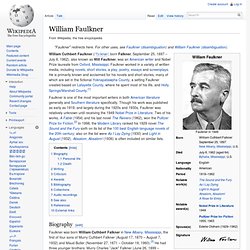
Faulkner was born and raised in the state of Mississippi, which had a great influence on him, as did the history and culture of the American South altogether. Soon after Faulkner's first birthday, his family moved to Ripley, Mississippi from New Albany. Here, his father Murry worked as the treasurer for the family's Gulf & Chicago Railroad Company, a business he had been drawn to from an early age. Murry had hoped to inherit the railroad from his father, John Wesley Thompson Falkner. As a schoolchild, Faulkner had much success early on. E. M. Forster. Early years[edit] Forster was born into an Anglo-Irish and Welsh middle-class family at 6 Melcombe Place, Dorset Square, London NW1, in a building that no longer exists.
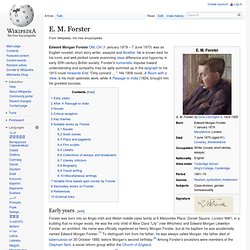
He was the only child of Alice Clara "Lily" (née Whichelo) and Edward Morgan Llewellyn Forster, an architect. F. Scott Fitzgerald. Francis Scott Key Fitzgerald (September 24, 1896 – December 21, 1940) was an American author of novels and short stories, whose works are the paradigmatic writings of the Jazz Age, a term he coined.
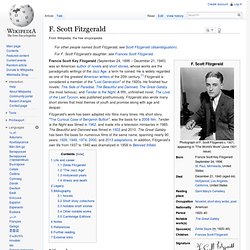
He is widely regarded as one of the greatest American writers of the 20th century.[1] Fitzgerald is considered a member of the "Lost Generation" of the 1920s. Charles Darwin. Charles Robert Darwin, FRS (/ˈdɑrwɪn/;[1] 12 February 1809 – 19 April 1882) was an English naturalist and geologist,[2] best known for his contributions to evolutionary theory.
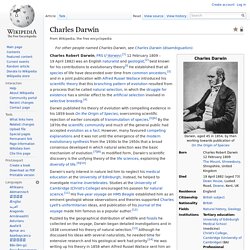
[I] He established that all species of life have descended over time from common ancestors,[3] and in a joint publication with Alfred Russel Wallace introduced his scientific theory that this branching pattern of evolution resulted from a process that he called natural selection, in which the struggle for existence has a similar effect to the artificial selection involved in selective breeding.[4] Darwin published his theory of evolution with compelling evidence in his 1859 book On the Origin of Species, overcoming scientific rejection of earlier concepts of transmutation of species.[5][6] By the 1870s the scientific community and much of the general public had accepted evolution as a fact.
Biography Early life and education Painting of seven-year-old Charles Darwin in 1816. Joseph Conrad. Joseph Conrad (born Józef Teodor Konrad Korzeniowski;[1]:11–12 Berdichev, Imperial Russia, 3 December 1857 – 3 August 1924, Bishopsbourne, Kent, England) was a Polish author who wrote in English after settling in England.
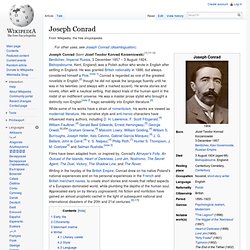
He was granted British nationality in 1886, but always considered himself a Pole. Ernest Hemingway. D. H. Lawrence. David Herbert Lawrence (11 September 1885 – 2 March 1930) was an English novelist, poet, playwright, essayist, literary critic and painter who published as D.
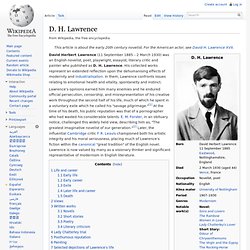
H. Lawrence. His collected works represent an extended reflection upon the dehumanising effects of modernity and industrialisation. Samuel Beckett. Samuel Barclay Beckett (/ˈbɛkɪt/; 13 April 1906 – 22 December 1989) was an Irish avant-garde novelist, playwright, theatre director, and poet, who lived in Paris for most of his adult life and wrote in both English and French.
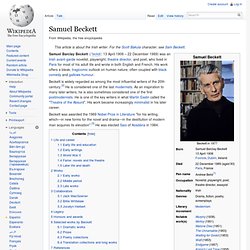
His work offers a bleak, tragicomic outlook on human nature, often coupled with black comedy and gallows humour. Beckett is widely regarded as among the most influential writers of the 20th century.[2] He is considered one of the last modernists. As an inspiration to many later writers, he is also sometimes considered one of the first postmodernists. He is one of the key writers in what Martin Esslin called the "Theatre of the Absurd". His work became increasingly minimalist in his later career. Beckett was awarded the 1969 Nobel Prize in Literature "for his writing, which—in new forms for the novel and drama—in the destitution of modern man acquires its elevation".[3] He was elected Saoi of Aosdána in 1984.
Waiting for Godot. Friedrich Nietzsche. Friedrich Wilhelm Nietzsche (/ˈniːtʃə/[1] or /ˈniːtʃi/;[2] German: [ˈfʁiːdʁɪç ˈvɪlhɛlm ˈniːt͡sʃə]; 15 October 1844 – 25 August 1900) was a German philosopher, cultural critic, poet, composer and Latin and Greek scholar.
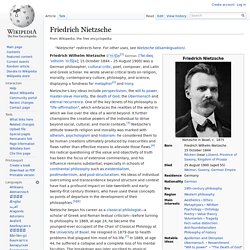
He wrote several critical texts on religion, morality, contemporary culture, philosophy and science, displaying a fondness for metaphor[3] and irony. Nietzsche's key ideas include perspectivism, the will to power, the death of God, the Übermensch and eternal recurrence. One of the key tenets of his philosophy is "life-affirmation", which embraces the realities of the world in which we live over the idea of a world beyond.
Nietzsche began his career as a classical philologist—a scholar of Greek and Roman textual criticism—before turning to philosophy. Franz Kafka. Kafka was born into a middle-class, German-speaking Jewish family in Prague, the capital of the Kingdom of Bohemia, then part of the Austro-Hungarian Empire. In his lifetime, most of the population of Prague spoke Czech, and the division between Czech- and German-speaking people was a tangible reality, as both groups were strengthening their national identity. The Jewish community often found itself in between the two sentiments, naturally raising questions about a place to which one belongs. Kafka himself was fluent in both languages, considering German his mother tongue. Kafka trained as a lawyer and after completing his legal education, obtained employment with an insurance company.
He began to write short stories in his spare time. Life[edit] Family[edit] Plaque marking the birthplace of Franz Kafka in Prague. The Kafka family had a servant girl living with them in a cramped apartment. Education[edit] Employment[edit] Former home of the Worker's Accident Insurance Institute. Miss FB. The Metamorphosis - A Study: Nabokov on Kafka (1989) Christopher Plummer.
Site/EXSupplementalReadings_files/Franz Kafka - The Complete Stories.pdf. Virginia Woolf. Adeline Virginia Woolf (/ˈwʊlf/; nee Stephen; 25 January 1882 – 28 March 1941) was an English writer, and one of the foremost modernists of the twentieth century. During the interwar period, Woolf was a significant figure in London literary society and a central figure in the influential Bloomsbury Group of intellectuals.
Her most famous works include the novels Mrs Dalloway (1925), To the Lighthouse (1927) and Orlando (1928), and the book-length essay A Room of One's Own (1929), with its famous dictum, "A woman must have money and a room of her own if she is to write fiction. " Woolf suffered from severe bouts of mental illness throughout her life, thought to have been the result of what is now termed bipolar disorder,[1] and committed suicide by drowning in 1941 at the age of 59. Early life[edit] Woolf was educated by her parents in their literate and well-connected household at 22 Hyde Park Gate, Kensington.
Bloomsbury[edit] The Bloomsbury Group - Literature Periods & Movements. Literature Network » Literary Periods » The Bloomsbury Group The Bloomsbury Group was a small, informal association of artists and intellectuals who lived and worked in the Bloomsbury area of central London. Most prominent of these was novelist and essayist Virginia Woolf. In all, only about a dozen people at any one time could have called themselves members of the group. The Recorded Voice Of Virginia Woolf. W. B. Yeats.
F. Scott Fitzgerald.